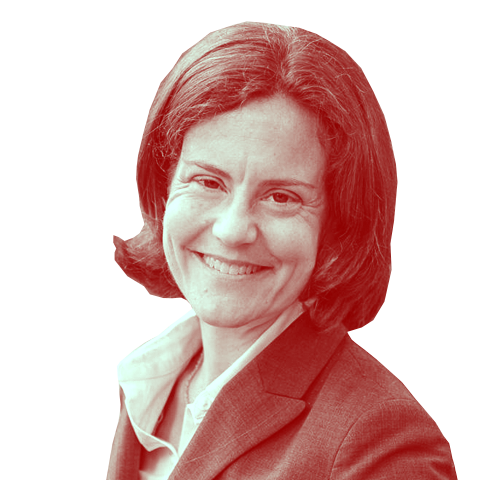Georgia elections in US showcase the nuts and bolts of democracy building
Zurich-based American law lecturer Alexandra Dufresne sees both positive signs and cautionary tales for the world’s democracies in recent US political developments.
The attack on the United States capitol by right-wing extremists has understandably dominated news headlines around the world. Almost every American I know is angry, frightened and heartsick. With 373,000 dead from Covid-19, devastating job losses and millions of children unable to attend school in person, it feels like a particularly dark time in the US.
However, dramatic video footage of extremist violence should not be allowed to overshadow a tremendous – and historic – bit of good news. This news is monumental for the US and will impact Europe as well.

More
‘Disturbing, shocking, historic’: Swiss papers react to US Capitol riot
Last week, two Democratic candidates, Raphael Warnock and Jon Ossoff, won the Senate run-off elections in Georgia, giving Democrats a majority in the 100-seat chamber with the incoming Democratic Vice President casting the deciding vote.
Democrats’ control of Congress is essential to President-elect Joe Biden’s ability to achieve his policy priorities with respect to healthcare, the economy, immigration and the environment. While the executive branch can make some decisions by executive action, large-scale reforms can happen only through the lawmaking and appropriations process conducted by Congress. Democratic control also means that Republicans will be unable to block or delay the appointment of federal judges or key presidential appointments. This will enable the Biden administration to hit the ground running, which it must do to get the Covid-19 pandemic and the economy under control.
This will also impact Switzerland and the rest of Europe. The most significant effect will likely be in the field of combating climate change, a top priority for the Biden administration. While President-elect Biden can reverse several of President Trump’s environmentally harmful executive acts and rejoin the Paris Accord even without Congressional support, he needs both houses of Congress to make significant and lasting investments in green energy.
Empowering voters
I grew up in Atlanta, Georgia. I left in 1992, when I was 18, and rarely returned. I have found over the years that it is almost impossible to explain to someone who has not visited Georgia the degree of racial segregation and inequality, or how deeply politically conservative it is – or was. Most of my friends and colleagues from the American South – of all racial and ethnic backgrounds – and I are overjoyed by the election results but are deeply surprised. I personally have never been so happy to be proven wrong.
Most attribute the victory to the inspirational leadership of Stacey Abrams, a former member of the Georgia state legislature and former candidate for governor, who began laying the groundwork for Democratic victories in Georgia many years ago, when many thought her dream was impossible. If you read Abrams’s book, Our Time is NowExternal link, or hear her speak, it is immediately apparent that she is a visionary of rare political talent.
But Abrams did not do it alone. Her leadership was effective because she inspired thousands of people to invest in the infrastructure – the nuts and bolts – of electoral politics: grassroots, community-based empowerment and mobilization. She focused not just on big-picture policy goals but also on the endless, painstaking details of combating voter suppression techniques to protect everyone’s right to vote. Legions of grassroots activists and organizationsExternal link worked to get out the vote External linkin communities previously disenfranchised or ignored, moving from a “transactional” model of politics, whereby candidates ask for voters’ support during campaign season, to an empowerment-based model, whereby local activists and community organizers engage their neighbors on issues of importance even in non-election years. These groups built common ground between rural and urban voters and among voters of diverse different racial and ethnic backgrounds.
All that investment in people and infrastructure paid off. Over 4.4 million people, or 60% of eligible voters, voted in the Senate runoff election, which is more than twice the previous record for voter turnout in a runoff. African-Americans and young people, in particular, voted at historic rates, which is particularly remarkable given the challenges of the pandemic.
No democracy is exceptional
The past four years have taught many Americans not to take our democratic institutions for granted. It always puzzles me when fellow Americans express shock and disbelief that we are now behaving like “one of those other countries” we associate with political violence. Much of my career has been spent representing people fleeing political persecution. Of course, the US can be like other countries that have struggled with political violence. Have we forgotten 1775, 1860, 1968? Did we really think we were special?

More
On impeachment, US senators are bound by oath to ‘do impartial justice’
One does not have to read much history to recognize that tyranny, anarchy, and war are the default and that peace, the rule of law and democracy are the exception. Democracy is a fragile thing. You have to tend to it, even when – especially when – your particular democracy is not in crisis.
I often hear people in Switzerland voice sentiments of exceptionalism similar to what I hear in the US. Switzerland is a peaceful, democratic, rule-of-law governed state in a chaotic world. But the things that make democracy work – a strong educational system, a robust media environment, social equality, open dialogue, a critical understanding of one’s history, limits on the power of corporations and other special interests, an impartial justice system, robust electoral infrastructure – take a lot of energy and vigilance to maintain. By the time one sees the cracks in the system, it can be too late to prevent much of the damage.
The experience in the US for the past four years has made me counsel people in Switzerland to be vigilant about protecting the norms needed to make democracy sustainable. This includes people on the progressive side of the debate. Some progressive organizations, friends, and thought leaders – including in Switzerland – share information on social media that is inaccurate or misleading. Misrepresentations might each seem harmless in and of themselves, but they chip away – however incrementally – at the public good of accurate information.
Doing the hard work
The problem is that tending to democracy in an effective way is often boring, painstaking and tedious. It is easier to complain on social media than to phone back and knock on doors. It is easier to blame one’s uncle for believing conspiracy theories than to research the media market that would have radicalized him, and the economic and social factors that would have led him to be an easy target for grievance-based radicalization. It is all too easy to privilege the voices of the wealthy and powerful over those of people who have been marginalized or treated as invisible. While it is essential to engage with important substantive topics – like fighting climate change – it is, at this moment, even more important to engage with structural issues, like gerrymandering, “winner take all” voting systems, voter disenfranchisement, polarizing primaries, and outsized corporate lobbies.
With respect to democracy-building in the US it is essential that everyone does their part. It is deeply unfair to expect people in communities of color – especially women – to continue to do all the heavy lifting. Doing one’s part does not mean sharing memes on social media or shaming family who support Donald Trump. It means taking the time to educate oneself on structural issues and joining forces with nonprofits and advocacy, activist and community organizations to rebuild the infrastructure of our democratic institutions at both the local and national levels. US citizens abroad can do their part by researching electoral reforms, fundraising for grassroots political organizations, getting out the vote, calling members of Congress, writing Letters to the Editor, amplifying the voices of grassroots activists, sharing best practices from other countries, helping people register to vote and comply with technical voting requirements, taking part in protests and demonstrations, and phone and text banking.
This nuts-and-bolts work is necessary because at the end of the day it is not hard to incite people to use violence to tear things down. It is not hard to persuade people that the system is fundamentally rigged against them, that “truth” is what is convenient at the moment, and a much-needed sense of community by nursing one’s grievances and flirting with conspiracy theories. And it is not hard to convince oneself that the suffering of “others” – whether liberal or conservative – is not real or does not matter.
It is hard, however, to inspire people to channel their hard-won resilience into building something real, robust and potentially lasting. Luckily, the painstaking work of individuals and communities in Georgia has demonstrated that even in the midst of a pandemic, investment in nuts-and-bolts community organizing and empowerment works. It can serve as an example to democracies everywhere.
Alexandra Dufresne teaches US law, international law, and children’s rights at institutions of higher learning in Switzerland. She works with refugee, human rights and development NGOs in Europe and is a co-founder of ‘Action Together: Zürich, CH’, an action group of US citizens in Switzerland.
The views expressed in this article are solely those of the author, and do not necessarily reflect the views of swissinfo.ch.
Opinion series
swissinfo.ch publishes op-ed articles by contributors writing on a wide range of topics – Swiss issues or those that impact Switzerland. The selection of articles presents a diversity of opinions designed to enrich the debate on the issues discussed. If you would like to submit an idea for an opinion piece, please e-mail english@swissinfo.ch

In compliance with the JTI standards
More: SWI swissinfo.ch certified by the Journalism Trust Initiative








